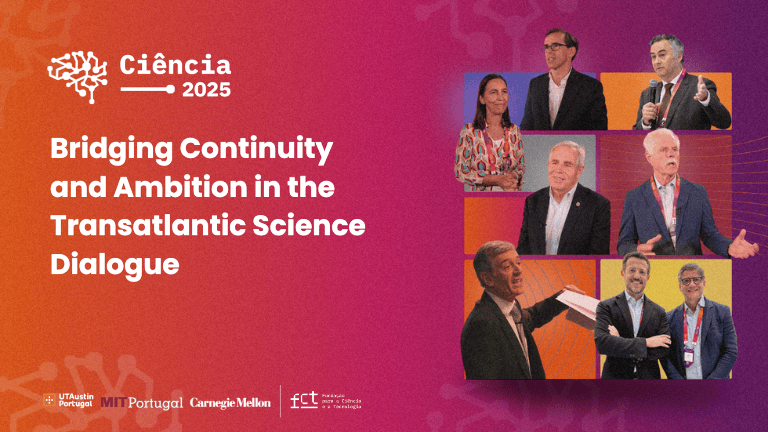On July 9, at Nova SBE, the UT Austin Portugal Program joined its longstanding peers CMU Portugal and MIT Portugal for a joint session under the theme “FCT’s Partnerships with U.S. Universities: Shaping the Future through Impactful Science.” This wasn’t merely a moment of reflection. It was a working session, a reaffirmation of purpose, and a coordinated step toward 2030.
The 90-minute workshop brought together policymakers, researchers, entrepreneurs, and institutional leaders to reflect on the Programs’ contributions over nearly two decades – through the testimonials of various stakeholders – and to offer a glimpse into what lies ahead for Portugal’s collaborations with top U.S. institutions.
Scientific Depth Meets Societal Application
After the opening remarks by João Magalhães, National Co-Director for CMU Portugal – who emphasized that while each partnership has its own identity, all three share a common goal: enabling Portugal to thrive as a country that produces knowledge, develops technology, trains people, and generates impact beyond its borders – the audience moved into a discussion about the Successful Journey from the Research Bench to the Market,” moderated by Prof. John Hansman (MIT). This round table showcased what this transatlantic cooperation means in practice.
Three voices, each deeply embedded in their Program’s trajectory, provided vivid accounts:
-
- Paulo Dimas, VP at Unbabel and CEO of the Center for Responsible AI, reflected on how the CMU Portugal partnership catalyzed their frontier AI work:
“These initiatives keep Portugal’s brightest minds connected to national challenges, and help them stay. That’s the long-term value of these partnerships.”
- Paulo Dimas, VP at Unbabel and CEO of the Center for Responsible AI, reflected on how the CMU Portugal partnership catalyzed their frontier AI work:
- Hélder Silva, Head of Aerospace Flight Software at Thales Edisoft and PI of the AEROS project (MIT Portugal), highlighted the space-ocean synergies enabled by nanosatellite missions, and how deep, sustained collaboration has contributed to Portugal’s reaffirmation in the space sector.
- John G. Ekerdt, UT Austin Professor Emeritus and UT Austin Portugal’s Program PI, emphasized the centrality of capacity-building:
“We saw transformation not just in research, but in people. BOB laid the groundwork. Deucalion is the multiplier. And trust is what powers it all.”
Each speaker showed that the Program’s success doesn’t lie in isolated wins. It’s in the systems we’ve built and the continuity we’ve maintained.
What We’ve Built and What We’re Building
The UT Austin Portugal presentation shared concrete results:
- 67 joint projects since 2012 covering exploratory and strategic research
- Committed public funding: ~€14.43M + ~$14.7M USD
- Flagship projects like uPGRADE (Earth observation cubesat) now entering deployment phase
- High-performance computing milestones that led to the creation of Portugal’s supercomputing infrastructure
- Entrepreneurship initiatives like TechLaunch, connecting Portuguese startups with U.S. investment networks
- Ongoing talent development through internships, research exchanges, and short courses
All of this, coordinated with FCT and Portuguese institutions, is not simply programmatic. It’s systemic.
A Common Commitment to Act
The session concluded with Minister Fernando Alexandre who emphasized the vital role these partnerships play in reinforcing Portugal’s innovation base and positioning its scientific community on the global stage. The Minister also announced upcoming developments regarding the revised governance model.
From Portugal to Austin: A Partnership that Delivers
The increased ambition that characterizes the Partnerships in this new phase began taking shape some time ago. Minister Fernando Alexandre’s visit to UT last year marked a defining moment in the negotiations for the Program’s renewal. . Lab tours, researcher dialogues, and a mutual recommitment marked the occasion.
As the Cockrell School of Engineering wrote in their recent piece:
“Researchers from The University of Texas at Austin have worked with Portugal’s best and brightest minds to launch unicorn startups, build up the country’s technology base and facilitate research collaborations beyond institutional and national borders.”
This relationship continues into Phase 4. Not with nostalgia, with intention. Not as a diplomatic formality, as a tested, trusted, and future-facing alliance.
Read the full UT Austin feature – “From Portugal with Engineering”

